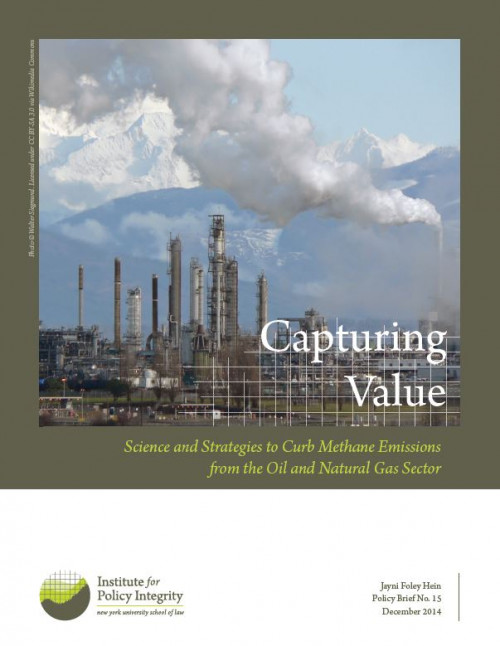-
Regulatory Report on Oil Dispersants
Our new regulatory report offers guidance on how how the EPA can improve its cost-benefit analysis for a new proposed rule regulating the dispersants used to clean up oil spills and other major pollution events.
-
Comments on New Offshore Leasing Plan
Policy Integrity recently filed public comments on the Bureau of Ocean Energy Management’s (BOEM’s) new offshore leasing proposal, suggesting that the agency update its use of “option value” to improve its valuation of offshore resources.
-
Court Rules on Offshore Leasing Lawsuit
Policy Integrity senior advisor Michael Livermore represented the plaintiff in Center for Sustainable Economy v. Jewell, a lawsuit challenging the Bureau of Ocean Energy Management’s (BOEM’s) 2012-2017 leasing plan for the Gulf of Mexico and the Alaskan coast. The Center for Sustainable Economy (CSE) argued that incomplete and flawed economic analysis leads the government to sell resource leases too quickly and too cheaply, potentially costing the American public billions of dollars and leading to high-risk drilling. Today, the U.S. Court of Appeals for the D.C. Circuit ruled against CSE in the case. However, part of the ruling could lead to major changes in how the government values the natural resources it leases.
-
Victory at Sea: New Offshore Leasing Program Begins to Adopt Policy Integrity Recommendations
Policy Integrity’s multi-year effort to make the government account for “option value” in its natural resource leasing decisions has begun to pay off. In its new proposal for offshore oil and gas leasing from 2017-2022, the Department of the Interior’s Bureau of Ocean Energy Management (BOEM) devotes 12 pages to option value and related resource valuation concepts, which will now be considered in leasing decisions. Much of this language closely resembles the arguments Policy Integrity has made to the agency repeatedly since 2009.
-

Capturing Value
Science and Strategies to Curb Methane Emissions from the Oil and Natural Gas Sector
Methane, the primary component of natural gas, is a potent climate pollutant up to 86 times more powerful than carbon dioxide on a 20-year timeframe. Currently the United States loses at least 1 to 3 percent of its total natural gas production each year when methane is leaked or vented to the atmosphere. Federal regulations could reduce methane emissions by up to 50 percent at little or no net cost, using available technologies.
-
Oil Train Safety - Public Comments
Driven by growth in the production of oil in the U.S. and Canada, there has been a significant increase in rail transportation of crude oil over the past five years, with a corresponding increase in the number of accidents. Many oil trains pass through sensitive environmental habitats and densely populated areas, and even share track with commuter trains in some regions.
-
Livermore Argues Offshore Leasing Case in DC Circuit Court
The government’s offshore leasing system fails to account for uncertainties about environmental harms—the system ignores “option value,” a well-established economic technique that quantifies the value of delaying decisions to acquire crucial information. As a result, the current leasing system leads to over-exploitation of natural resources and excessive environmental risk.
-
Offshore Leasing and Option Value - Comments on BOEM’s 2017-2022 Leasing Program
Policy Integrity recently submitted comments to the Bureau of Ocean Energy Management (BOEM) on its five-year offshore leasing program from 2017-2022. BOEM is charged with stewarding vital and valuable resources for the benefit of the American people. On the one hand, the agency must direct the orderly development of offshore oil and gas deposits; at the same time, the agency must safeguard the ecosystems, cultural assets, and human lives affected by resource extraction decisions, and must preserve competing uses of offshore areas. BOEM thus has a responsibility to ensure the reasonable development of offshore resources so that costs to society are appropriately balanced against the benefits generated. Moreover, BOEM must collect a fair return on any of the American people’s oil and gas reserves that are leased for private development. Finally, the agency must attend to the different effects of offshore development on different regions, ecosystems, and communities.
-
Opening Brief Filed in Offshore Drilling Lawsuit
Policy Integrity, on behalf of the Washington, D.C.-based Center for Sustainable Economy, filed the opening brief in a lawsuit to halt illegal practices at the Bureau of Ocean Energy Management. The brief argues that incomplete and flawed economic analysis leads BOEM to sell new offshore leases too quickly and too cheaply, potentially costing the American public hundreds of billions of dollars.
-
Lawsuit Challenging BOEM’s plan for selling offshore leases
Policy Integrity, along with environmental attorney Steven Sugarman, are counsel to the Center for Sustainable Economy (CSE) in their lawsuit against the Bureau of Ocean Energy Management (BOEM) to halt the agency’s first five-year outer continental shelf oil and gas leasing program approved since the Gulf oil disaster.
Viewing recent projects in Natural Resources
